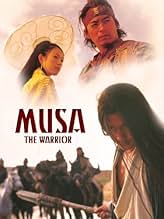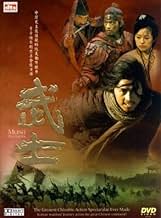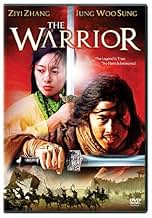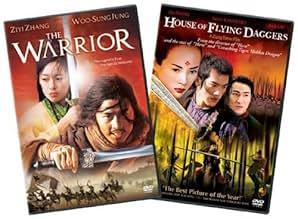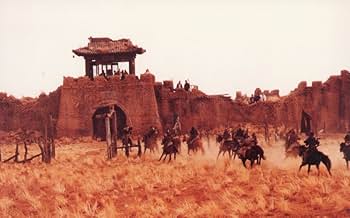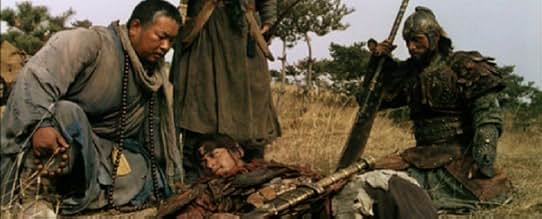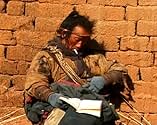Na China de 1937, em meio às disputas ferozes entre as dinastias Yuan e Ming, um grupo de emissários coreanos enviados para negociar com o governo descobre que uma princesa foi sequestrada e... Ler tudoNa China de 1937, em meio às disputas ferozes entre as dinastias Yuan e Ming, um grupo de emissários coreanos enviados para negociar com o governo descobre que uma princesa foi sequestrada e decide organizar um resgate.Na China de 1937, em meio às disputas ferozes entre as dinastias Yuan e Ming, um grupo de emissários coreanos enviados para negociar com o governo descobre que uma princesa foi sequestrada e decide organizar um resgate.
- Direção
- Roteirista
- Artistas
- Prêmios
- 6 vitórias e 11 indicações no total
- Princess Bu-yong
- (as Zhang Ziyi)
- Ga-nam
- (as Park Jung-hak)
- Yongho Soldier
- (as Mi-Nam Jung)
Avaliações em destaque
My Grade: A
Region 0 DVD Extras: nothing and it's the 132 minute international cut. I love this film, but try your best to seek out the R2 Scandinavia 3-Disc SE, as it has the longer 155 minute version AND the international cut AND a great deal of extras
I saw this one by accident thinking it was Hero, the massive 2002 Oscar nominee also starring Zhang Ziyi (and, for all its dodgy ideology, worth discovering for the visual feast alone). The region 2 (Korean & French audio 5.1) looked good so I rented it... Back when that was still a thing.
First, this is not Hero, nor is it a wuxia or wire-work driven martial arts film. This is a Historical action film, and despite the prowesses of its heroes, Musa's violence is realistic and brutal. It is a very clever men-on-a-mission flick, with interesting balance and variety within the team, with echoes of Seven Samurai. Where things take an even more pleasant turn are in the interesting portrayal of our characters: a borderline unlikable "hero" (or so he seems at first) and princess, great nobility in the lower ranks, and a surprisingly likable and charismatic villain, if indeed you can call him that.
In production value terms, this can compete with anything Hollywood churns out, and the technical credits, from editing to earthy cinematography, are all excellent. Fast-shutter action, made popular by Saving Private Ryan and Gladiator, is put to brutal use here, and there is a fine balance of chaotic individual moments and interesting strategies, something that would later be explored in John Woo's Red Cliff. This film procures that very rare delight of watching a film and knowing exactly where all the money, effort and care went, because it is all up there on screen, and for once, equally distributed, performances included. Something you have got to see.
For your consideration, ladies and gentlemen: Musa.
1)The tempermental and rebellious "hero" who has a serious self control problem gets the entire ancient Korean Caravan in trouble with his psychotic propensity towards violence. The Caravan saves themselves and the hero with cunning and wit. 2)The "hero" puts the entire Caravan in jeopardy again by cutting off the head of one of the merchants. This time many Caravan members die but they still escape relatively intact. 3)The Caravan finds a way to escape from their dire situation but the "hero" puts an end to their salvation by doing something totally stupid and irrational. Again, the great leadership, solidarity, and fighting ability of the Caravan saves them from disaster.
By this time, I began to beg someone to have the senses to kill the "hero" who was getting everyone else killed with his irresponsible actions. Instead of languishing in frustration, I decided to use my remote control.
The "hero" is played by Jung Woo Sung, one of the worst, and yet one of the most popular, actors in Korea. The only characters he usually plays are the silent rebellious types who act angry all the time, probably to hide his lack of acting ability.
This was the most expensive movie made in Korea (few films have surpassed it since). Yet it was a box office bomb, and with a good reason.
This is an epic film, shoot over 9000 miles of China's northern region. Covering plains, prairies, forests, deserts and coastline. The cinematography is beautiful.
Though this is a Korean film, it utilizes the famous Chinese actress Zhang Ziyi, who portrays a kidnapped daughter of the Chinese Emperor.
Throughout most of the film the Korean warriors speak Korean. The Princess and the Chinese villagers speak Mandarin. Interestingly the Mongols also speak Mandarin to each other, historically inaccurate but Mongols don't go to movies these days. Some of the Koreans can also speak Mandarin. This is accurate since the educated Koreans of the time, could read, write and speak Chinese. This film is subtitled in English.
This is a grand story of honor, sacrifice and overcoming overwhelming odds. The Korean warriors must fight the larger forces of the Mongols. Using tactics and strategies not unlike that which you can find in Sun Tzu's the Art of War writings.
If you want some insight into the culture and attitudes of the people of this region, Musa is the movie for you.
First things first, yes... it really does look that good! All the way through . Like Zhang Yimou's SHANGHAI TRIAD, practically every frame is beautifully composed and rendered, and could easily hang on a gallery wall somewhere. There wasn't a single shot that I could imagine looking better than it did. The production design is incredible, the locations stunning, the special effects groundbreaking (the gore). I can't imagine how much time and money must have gone into its production, let alone talent and dedication.
MUSA is epic in the word's biggest sense - I couldn't help thinking of Homer's ILIAD and ODDYSEY in many parts, and those are basically the two stories that the word 'epic' was invented for. It makes Gladiator, Crouching Tiger etc look positively inconsequential. The movie is also made with an attention to detail that is remarkable. It is certainly the most convincing evocation of [relatively] ancient times that I have seen. You will really believe that you've been transported back to 400 something AD China, where Zhang Ziyi happens to be a princess and Yu Rong Guang a Mongol general. I really felt "Yes, this is what life was like back then. This is how things looked, this is how people behaved".
Despite the epic nature of the story, the central focus is always on a small-ish cast of characters, each of whom is very well conceived and developed throughout the movie's course. I'd guess there's about 15 major characters in the story, and a significant cast of minor characters. The performances are all superb - I'm pretty sure the actors themselves were quite convinced they really were their characters. The believability is enhanced by the costuming, makeup and I guess just good casting - all the different factions involved in the story totally look the part.
No epic would be complete without battle scenes, and MUSA has quite a few. These are all stunningly choreographed and filmed, not in a HK style like Bichunmoo, but in a completely real style. Beautifully shot of course, but the men fight like skilled soldiers really would (I'm sure), and get wounded/killed equally convincingly. The special effects of arrows and blades penetrating flesh are sometimes shockingly convincing. This might be disturbing to some, but it isn't played for titillation - it just adds to the gravity of the experience. It may be a little conspicuous that the heroes all manage to dispatch many times their own body weight in enemies, but you've got to give them *some* leeway for narrative convention .
There is a lot of planning involved in the battles, of a military nature, and this is also very convincing and fascinating. Almost as large a part of the process as the actual getting down to it with the weapons. A very believable insight into how battles were waged in the days when a bow & arrow was as hi-tech as weaponry got.
Hmmm... is there any aspect of the movie I haven't gushed praise over yet? A nod to the soundtrack I guess - good, very fitting. Sound effects in the battles are excellent. Ummm... and the lighting is really good too .
A cursory nod must be made to the films flaws as well though, lest I leave the reader with expectations of *total* perfection. The main flaw is that the movie wanders rather too far into melodrama & a little cliche towards the end. It would probably be kind of cheesy, except that it's all so well done you can't get too upset with it .
Você sabia?
- CuriosidadesDuring filming in China, Woo-sung Jung got knee-injury while shooting one of his fight scenes and had to stay behind after the Korean crew came back to Korea.
- Citações
Princess Bu-yong: You could have killed me! I am a Princess!
Yeo-sol: Stop yelling at me! Don't think you can do anything you like just because you are a Princess!
Princess Bu-yong: Unhand me!
[English translation subtitles from Mandarin Chinese in Korean language film]
- Versões alternativasInternational version runs ca. 25 minutes shorter.
- ConexõesReferenced in Para Sempre (2012)
Principais escolhas
Detalhes
- Data de lançamento
- Países de origem
- Idiomas
- Também conhecido como
- The Warrior
- Locações de filme
- Empresas de produção
- Consulte mais créditos da empresa na IMDbPro
Bilheteria
- Orçamento
- BND 8.000.000 (estimativa)
- Faturamento bruto mundial
- US$ 945.922
- Tempo de duração
- 2 h 38 min(158 min)
- Cor
- Mixagem de som
- Proporção
- 2.35 : 1





